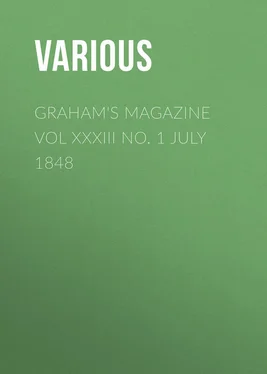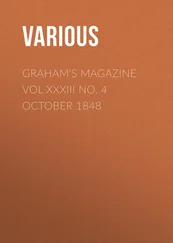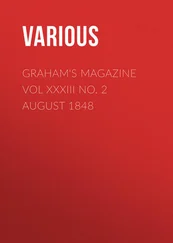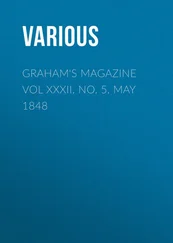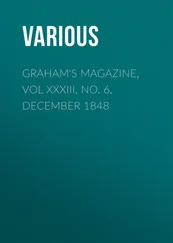Various - Graham's Magazine Vol XXXIII No. 1 July 1848
Здесь есть возможность читать онлайн «Various - Graham's Magazine Vol XXXIII No. 1 July 1848» — ознакомительный отрывок электронной книги совершенно бесплатно, а после прочтения отрывка купить полную версию. В некоторых случаях можно слушать аудио, скачать через торрент в формате fb2 и присутствует краткое содержание. Издательство: Иностранный паблик, Жанр: periodic, literature_19, foreign_edu, на английском языке. Описание произведения, (предисловие) а так же отзывы посетителей доступны на портале библиотеки ЛибКат.
- Название:Graham's Magazine Vol XXXIII No. 1 July 1848
- Автор:
- Издательство:Иностранный паблик
- Жанр:
- Год:неизвестен
- ISBN:нет данных
- Рейтинг книги:4 / 5. Голосов: 1
-
Избранное:Добавить в избранное
- Отзывы:
-
Ваша оценка:
- 80
- 1
- 2
- 3
- 4
- 5
Graham's Magazine Vol XXXIII No. 1 July 1848: краткое содержание, описание и аннотация
Предлагаем к чтению аннотацию, описание, краткое содержание или предисловие (зависит от того, что написал сам автор книги «Graham's Magazine Vol XXXIII No. 1 July 1848»). Если вы не нашли необходимую информацию о книге — напишите в комментариях, мы постараемся отыскать её.
Graham's Magazine Vol XXXIII No. 1 July 1848 — читать онлайн ознакомительный отрывок
Ниже представлен текст книги, разбитый по страницам. Система сохранения места последней прочитанной страницы, позволяет с удобством читать онлайн бесплатно книгу «Graham's Magazine Vol XXXIII No. 1 July 1848», без необходимости каждый раз заново искать на чём Вы остановились. Поставьте закладку, и сможете в любой момент перейти на страницу, на которой закончили чтение.
Интервал:
Закладка:
"But still, my son, he was found wanting. Had he submitted him as a Christian to the punishment the good God laid upon him – "
"The world would have pronounced him a spiritless, dishonored slave, father," said the count, answering the ecclesiastic's speech before it was yet finished, "and gentlemen would have refused him the hand of fellowship."
"Was he justified then, my father?" asked the boy eagerly, who had been listening with eager attention to every word that had yet been spoken. "Do you think, then, that he was in the right; that he could not do otherwise than to slay her? I can understand that he was bound to kill the man who had basely wronged his honor – but a woman! – a woman whom he had once loved too! – that seems to me most horrible; and the mode, by a slow poison! living with her while it took effect! eating at the same board with her! sleeping by her side! that seems even more than horrible, it was cowardly!"
"God forbid, my son," replied the elder nobleman, "that I should say any man was justified who had murdered another in cold blood; especially, as you have said, a woman, and by a method so terrible as poison. I only mean exactly what I said, that he was tried very fearfully, and that under such trial the best and wisest of us here below cannot say how he would act himself. Moreover, it would seem that mistaken as he was perhaps in the course which he seems to have imagined that honor demanded at his hands, he was much mistaken in the mode which he took of accomplishing his scheme of vengeance. It was made very evident upon his trial that he did nothing, even to that wretched traitress, in rage or revenge, but all as he thought in honor. He chose a drug which consumed her by a mild and gradual decay, without suffering or spasm; he gave her time for repentance, nay, it is clearly proved that he convinced her of her sin, reconciled her to the part he had taken in her death, and exchanged forgiveness with her before she passed away. I do not think myself that to commit a crime himself can clear one from dishonor cast upon him by another's act, but at the same time I cannot look upon Kerguelen's guilt as of that brutal and felonious nature which calls for such a punishment as his – to be broken alive on the wheel, like a hired stabber – much less can I assent to the stigma which is attached to him on all sides, while that base, low-lived, treacherous, cogging miscreant, who fell too honorably by his honorable sword, meets pity – God defend us from such justice and sympathy! – and is entombed with tears and honors, while the avenger is crushed, living, out of the very shape of humanity by the hands of the common hangman."
The churchman's lips moved for a moment, as if he were about to speak in reply to the false doctrines which he heard enunciated by that upright and honorable man, and good father, but, ere he spoke, he reflected that those doctrines were held at that time, throughout Christian Europe, unquestioned, and confirmed by prejudice and pride beyond all the power of argument or of religion to set them aside, or invalidate them. The law of chivalry, sterner and more inflexible than that Mosaic code requiring an eye for an eye, and a tooth for a tooth, which demanded a human life as the sacrifice for every rash word, for every wrongful action, was the law paramount of every civilized land in that day, and in France perhaps most of all lands, as standing foremost in what was then deemed civilization. And the abbé well knew that discussion of this point would only tend to bring out the opinions of the Count de St. Renan, in favor of the sanguinary code of honor, more decidedly, and consequently to confirm the mind of the young man more effectually in what he believed himself to be a fatal error.
The young man, who was evidently very deeply interested in the matter of the conversation, had devoured every word of his father, as if he had been listening to the oracles of a God; and, when he ceased, after a pause of some seconds, during which he was pondering very deeply on that which he had heard, he raised his intelligent face and said in an earnest voice.
"I see, my father, all that you have alleged in palliation of the count's crime, and I fully understand you – though I still think it the most terrible thing I ever have heard tell of. But I do not perfectly comprehend wherefore you ransack our language of all its deepest terms of contempt which to heap upon the head of the Chevalier de la Rochederrien? He was the count's sworn friend, she was the count's wedded wife; they both were forsworn and false, and both betrayed him. But in what was the chevalier's fault the greater or the viler?"
Those were strange days, in which such a subject could have been discussed between two wise and virtuous parents and a son, whom it was their chiefest aim in life to bring up to be a good and honorable man – that son, too, barely more than a boy in years and understanding. But the morality of those times was coarser and harder, and, if there was no more real vice, there was far less superficial delicacy in the manners of society, and the relations between men and women, than there is nowadays.
Perhaps the true course lies midway; for certainly if there was much coarseness then, there is much cant and much squeamishness now, which could be excellently well dispensed with.
Beside this, boys were brought into the great world much earlier at that period, and were made men of at an age when they would have been learning Greek and Latin, had their birth been postponed by a single century.
Then, at fifteen, they held commissions, and carried colors in the battle's front, and were initiated into all the license of the court, the camp, and the forum.
So it came that the discussion of a subject such as that which I have described, was very naturally introduced even between parents and a beloved and only son by the circumstances of the day. Morals, as regards the matrimonial contract, and the intercourse between the sexes, have at all times been lower and far less rigid among the French, than in nations of northern origin; and never at any period of the world was the morality of any country, in this respect, at so low an ebb as was France under the reign of the Fifteenth Louis.
The Count de St. Renan replied, therefore, to his son with as little restraint as if he had been his equal in age, and equally acquainted with the customs and vices of the world, although intrigue and crime were the topics of which he had to treat.
"It is quite true, Raoul," replied the count, "that so far as the unhappy Lord of Kerguelen was concerned, the guilt of the Chevalier de la Rochederrien was, as you say, no deeper, perhaps less deep than that of the miserable lady. He was, indeed, bound to Kerguelen by every tie of friendship and honor; he had been aided by his purse, backed by his sword, nay, I have heard and believe, that he owed his life to him. Yet for all that he seduced his wife; and to make it worse, if worse it could be, Kerguelen had married her from the strongest affection, and till the chevalier brought misery, and dishonor, and death upon them, there was no wedded couple in all France so virtuous or so happy."
"Indeed, sir!" replied Raoul, in tones of great emotion, staring with his large, dark eyes as if some strange sight had presented itself to him on a sudden.
"I know well, Raoul, and if you have not heard it yet, you will soon do so, when you begin to mingle with men, that there are those in society, those whom the world regards, moreover, as honorable men, who affect to say that he who loves a woman, whether lawfully or sinfully, is at once absolved from all considerations except how he most easily may win – or in other words – ruin her; and consequently such men would speak slightly of the chevalier's conduct toward his friend, Kerguelen, and affect to regard it as a matter of course, and a mere affair of gallantry! But I trust you will remember this, my son, that there is nothing gallant , nor can be, in lying, or deceit, or treachery of any kind. And further, that to look with eyes of passion on the wife of a friend, is in itself both a crime, and an act of deliberate dishonor."
Читать дальшеИнтервал:
Закладка:
Похожие книги на «Graham's Magazine Vol XXXIII No. 1 July 1848»
Представляем Вашему вниманию похожие книги на «Graham's Magazine Vol XXXIII No. 1 July 1848» списком для выбора. Мы отобрали схожую по названию и смыслу литературу в надежде предоставить читателям больше вариантов отыскать новые, интересные, ещё непрочитанные произведения.
Обсуждение, отзывы о книге «Graham's Magazine Vol XXXIII No. 1 July 1848» и просто собственные мнения читателей. Оставьте ваши комментарии, напишите, что Вы думаете о произведении, его смысле или главных героях. Укажите что конкретно понравилось, а что нет, и почему Вы так считаете.
